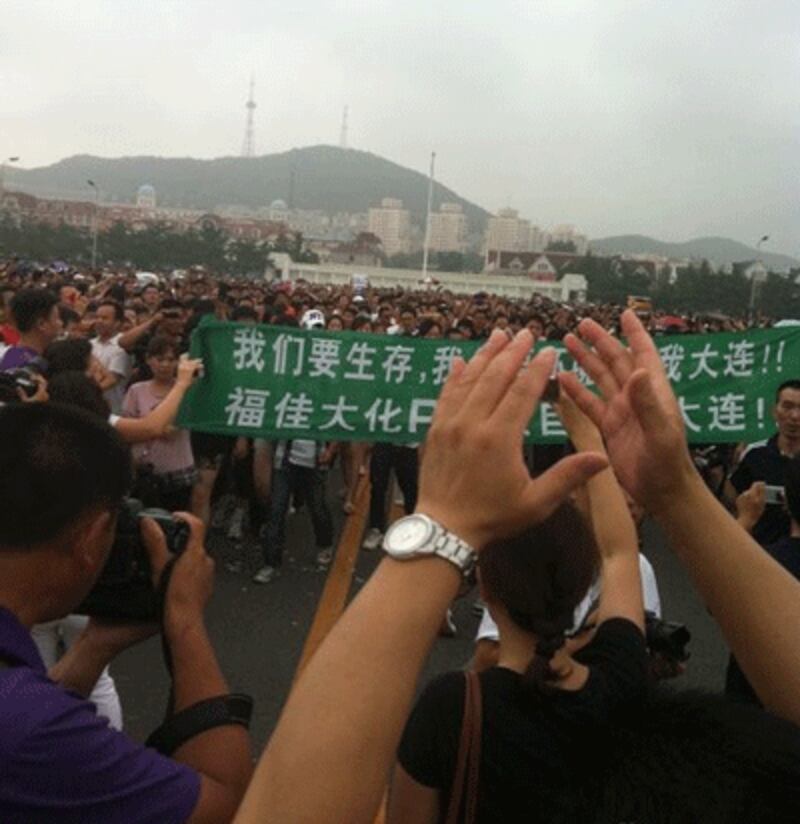Chinese authorities in the northeastern port city of Dalian have promised to close down a petrochemical plant following mass protests by residents, as Beijing moved to delete references to the incident from social media sites.
The pledge came from municipal Party secretary Tang Jun and mayor Li Wancai after thousands of residents took to the streets of Dalian at the weekend to call for the relocation of the Fujia Chemical Plant, which makes paraxylene (PX), a toxic and carcinogenic substance.
Video footage of the protests showed Tang standing atop a bus and shouting through a megaphone: "The plant will have to move!" and being greeted with further slogans and angry shouts.
Last week, a severe tropical storm breached sea defenses protecting the plant, prompting the authorities to evacuate nearby residents.
Protesters said they feared that the safety of the plant had been compromised.
"The breached defenses were repaired and no chemical leaks had been reported, but demands by members of the public to relocate the factory gathered steam," the official Xinhua news agency reported on Monday.
It said the protests had been fueled in part by social media ahead of Sunday's rally, which it described as "largely peaceful."
But it added: "Dalian's Party chief Tang Jun and Mayor Li Wancai tried to appease the crowd by promising to move the plant, but did not give a clear timetable as the protesters had demanded."
Banners

A Dalian resident at the scene surnamed Zhao said the protesters had unfurled banners at the gates of the municipal government.
"There is a little girl sitting on her daddy's shoulders holding a banner that says 'PX OUT'," he said. "There is also a young man dressed in chemical protective gear."
"The crowd has covered the whole of People's Square and all the grass verges around it," Zhao said.
"They are here to make a reasonable demand...and no one has behaved in an overly excited manner."
Placards read: "Give us back Dalian," and "Give us back our environment."
A second protester surnamed Wu said feeling was running high among the crowd, however, in a city which is famed through China for its clean air and sandy beaches.
"We are waiting for people to come out and hold talks with us," Wu said. "Our conditions are that the PX plant must go."
"Also, that they must be open and transparent about the real situation there," he added.
The Dalian protests echo a similar movement in the southeastern port city of Xiamen in 2007, when the municipal government backed down on a planned PX plant following massive popular anger and demonstrations.
However, the plant was restarted in a neighboring city two years later, official media reported in 2009.
Unprecedented
While Chinese Internet censors moved to delete overt references to the protests, as well as photographs of thousands of demonstrators taken from the air, media observers said there was an unprecedented breadth of coverage to the protests.
"...all related material is being scrubbed from the Internet," according to the Hong Kong-based blog China Media Project.
"While censorship of overt references and images of the protests themselves is plainly dampening the social media impact, however, anger over the chemical project is still quite visible, with many users posting “Get out Fujia PX!” messages," the blog said.
Photographs posted online showed long ranks of armed police in riot gear, as well as regular police, but overall the scene appeared ordered and calm.
Calls to the Dalian municipal government went unanswered on Sunday. An officer who answered the phone at the municipal police station said: "I don't really know about this."
The Dalian PX plant was approved by the State Development and Reform Commission in 2005 as a joint venture between the state-owned Dalian Chemical Group and private property developers Fujia.
One the the largest PX producers, the Fujia plant has been in operation since 2009, producing up to 700,000 tons of PX every year.
Reported by Xin Yu and Ding Xiao for RFA's Mandarin service, and by Fung Yat-yiu for the Cantonese service. Translated and written in English by Luisetta Mudie.
